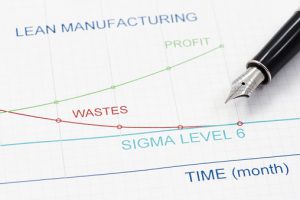Implementing process changes using Six Sigma and Lean represents just the first step in making an organization more efficient. Sustaining the improvements brought on by those changes is often the most difficult step.
A Michigan-based company, Freudenberg-NOK Sealing Technologies, provides a great example to other companies of how Lean can be both implemented and maintained.
It starts, according to company officials, with a commitment to the Lean philosophy backed by resources and actions.
“There are only three directions you can go in business,” Freudenberg-NOK Sealing Technologies president Matthew Portu told Industry Week. “You can go backwards and lose momentum, you can stay the course and hope that’s enough, or you can improve, get better at what you do, and grab new opportunities.”
His company, he said, has put the emphasis on improvement and growth.
Global Business
Freudenberg-NOK Sealing Technologies is considered a worldwide leader in the manufacturing and service of seals and vibration control devices that are critical components in a number of industries. These include automotive, civil aviation, mechanical engineering and ship building.
Freudenberg also does work for food companies, pharmaceutical manufacturers and makers of agricultural and construction machinery.
The company, which serves customers in the Americas, is based in Plymouth, Mich. It is a joint venture between Freudenberg Sealing Technologies of Germany and NOK Corp. of Japan. The company is part of the German-based Freudenberg Group, a global network that operates in 60 countries and employs more than 80,000 people.
Twenty-five years ago, Freudenberg-NOK put into a place a Lean-based program called GROWTTH – Getting Rid of Waste Through Team Harmony.
Putting Lean Into Action
Over the course of two and half decades, Freudenberg-NOK has reached a number of milestones in its use of Lean. They include:
- Completing 94,000 Lean and Six Sigma projects
- Saving more than $414 million
- Training more than 130 employees as Lean certified and Six Sigma Black Belts
The key to all these achievements has been a full commitment to making Lean a central part of the operation.
The company demonstrates that commitment year in and year out. On the company website, a report shows that in 2015 alone the company trained 70 employees as Lean executives, administrative experts and Six Sigma Black Belts.
Over the years, the company has made use of a variety of Lean tools, adding new ones continuously. They especially make use of Rapid Plant Assessments.
Developed by R. Eugene Woodson, and first published in the Harvard Business Review in 2002, the tool provides a fast way to evaluate the performance of a plant. More specifically, unlike a regular audit, the Lean-based rapid assessment looks not only for problems, but also to see where implemented Lean strategy is working correctly.
Freudenberg-NOK uses independent auditors not associated with the plant to make the assessments. In 2015, according to the company, the average percentage of improvement in Rapid Plant Assessments scores across all plants was 85%.
Focus On Learning
The company also places a premium on learning. In addition to formal training, the company fosters a culture of sharing best practices and standards between employees.
“We all strive to help one another become the best we can possibly be. We have a lot of programs in place right now focused on that particular topic,” Vicky Jandreau, director of the company’s GROWTTH program in North America, told Industry Week.
All of this has combined to sustain the company’s success with Lean Six Sigma for more than two decades. They provide a great example of not only how Lean can get implemented, but also maintained.
